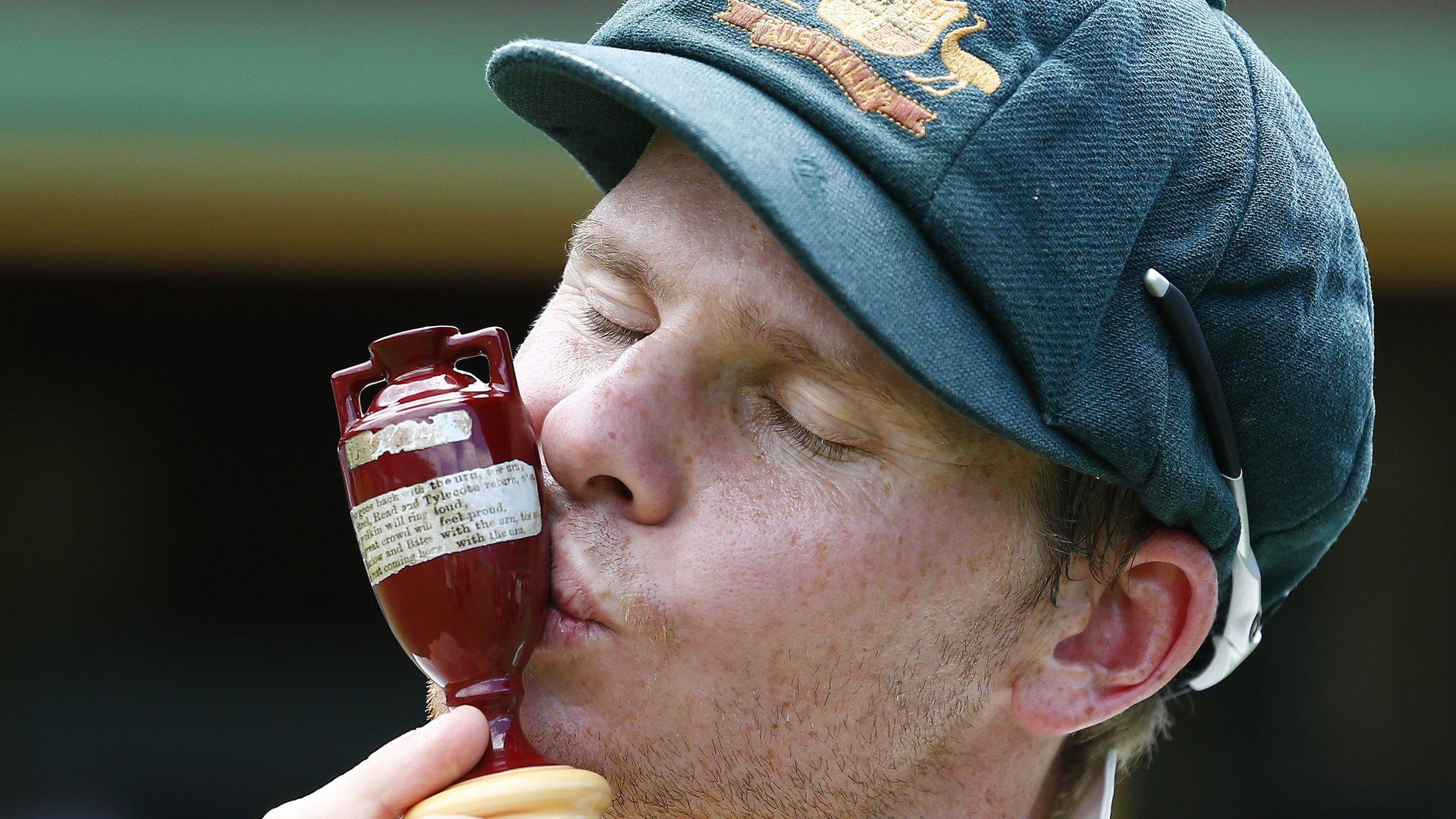Ashes: Inside story of England's 5-0 defeat in Australia in 2013-14
- Published
- comments
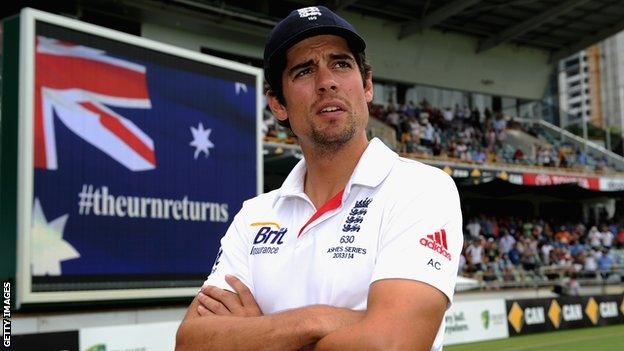
England captain Alastair Cook after losing the Ashes in 2013-14
They called it the Pomnishambles. That was the polite stuff.
England set off for the 2013-14 Ashes in Australia unbeaten in 13 Tests, having held the urn for more than 1,500 uninterrupted days.
Their opponents had been beaten seven times in their previous nine Tests.
In the space of two months, Alastair Cook's team were torn apart. In the Test series they were thrashed 5-0, losing all 100 possible wickets for the first time in a five-match series.
One key batsman was sent home with a stress-related illness; a critical bowler retired; their best player would never pull on an England shirt again.
It was the disaster down under, the winter of our dismemberment. A team who had gone to number one in the world would never be the same again.
This is the inside story of that catastrophic tour, told by those who were at the heart of it. It is not pretty - unless you are Australian, of course.
Stifled in Stafford

England prepared for the Ashes tour with a team-building trip to tranquil Stafford
England had prepared for the previous Ashes tour with a team boot camp in the forests of southern Germany, camping out in the rough and hiking with bricks in their backpacks. In September 2013 they were sent on another team bonding exercise - this time to Stafford, in the West Midlands.
Boyd Rankin, England seamer: "We were doing some surveillance of terrorists. Or they were set up as terrorists.
"We were split up into groups. Each group had to follow a particular guy round Stafford. It was a bit strange. We seemed to spend a lot of time in cars. We were told to blend in with our environments, so it probably didn't help that I was 6ft 8in."
Graeme Swann, England spinner: "We had to go into pubs and keep tabs on a suspect. I'll never forget Matt Prior, wearing an England cap with three lions on it and an England jumper, trying to surreptitiously order a pint of water while watching a bloke at the other end of the bar.
"People were coming up to him - 'here mate, are you Matt Prior? Can I have your autograph?'
"It was a shambles. We sat in a Morrisons car park for 15 hours a day in a hire car. I hated every minute of it."
The warm-ups that cooled down

The England team which toured Australia in 2013-14 took part in this photo shoot at Lord's before their departure
England landed in Perth just weeks after winning a home Ashes series 3-0. But there were problems lurking under the surface.
They hadn't had an opening partnership of more than 50 in any first innings of a first Test in their past 14 series. They hadn't made it past 400 in a single one of their previous 17 innings.
Then there was the bowling. In their opening tour match, a scratch Western Australia Chairman's XI ran up a first-innings total of 451-5 declared.
One fast bowler, Chris Tremlett, went wicketless for 88 runs. Another, Steven Finn, took 1-123. And as for their talismanic spinner…
Swann: "I went over there very nervous. In the last Test of the summer at The Oval, I'd had a complete loss of feeling in the fingers of my bowling hand. I got out there desperate to play in the first warm-up match in Perth to prove to myself that I was OK.
"I went to [team director] Andy Flower and was told, you can't, we're not going in with what we want the Test team to be. It's a bowl-off between the fast men.
"I had to bowl in the nets, and I remember bowling a couple of double-bouncers and a beamer at Alastair Cook because I couldn't feel the ball, and him looking at me and smiling nervously."
The unexpected renaissance
Australia's Mitchell Johnson had ended the corresponding Ashes series three years before as a figure of fun - shipping 554 runs in four matches, unable to control his line, bowled for a golden duck as England sealed a 3-1 win in Sydney.
The Barmy Army had their old song all ready to go. Except something had changed.
Swann: "Word came from the one-day series in late summer 2013 that Johnson was bowling rockets., external And when your batsmen are saying someone's bowling quick... I've never heard that in an England dressing room before."

The headline on Australian website ABC two months out from the Ashes in September 2013
In that opening Test in Brisbane, after Australia had been bowled out for 295, Johnson was brought on to bowl. His first six overs went for 32, often a long way down leg side.
But in his third spell, from round the wicket, he was transformed. In 13 often unplayable balls, he took three wickets for two runs.
Mitchell Johnson, Australia fast bowler: "You know the song is coming - so I just sang Frozen in my head! A happy song. Let It Go…"

Mitchell Johnson kept his focus by thinking about his daughter and humming songs to her favourite film, Frozen
Chris Rogers, Australia opener: "We had felt hard done by to lose 3-0 away from home. But we had some good plans for back in Australia, and the guys were pretty motivated.
"In the one-day series, Johnson had hit Jonathan Trott on the helmet, and we spotted that Trott was closing off to that ball aimed at his left shoulder.
"When Mitchell got Trott caught down the leg side in Brisbane, that was the watershed moment - we knew from there that we could win the series.
"Then Kevin Pietersen found it so quick that he tried to play the pull shot, was nearly caught at fine leg and then was caught at fine leg. It takes something special to rattle that type of player. Once that happened we knew we had the weapons to beat them."
In the space of 53 dismal mid-afternoon minutes, England lost six prime wickets for nine runs. From a position of comfort at 82-2, they were blasted out for only 136.
In their second innings, they lost four wickets for nine runs. Johnson took nine wickets in the match. England lost by 381 runs.
Monty Panesar, England spinner: "We underestimated Johnson. Maybe we got too confident that the Barmy Army song was correct - he does bowl to the left, he does bowl to the right. And he actually proved all of us wrong.
"I felt in training we didn't prepare for Mitchell at all. Even after Brisbane we thought, this could be a one-off. He's got one good spell in him, he won't find his rhythm all series, he's going to have a bad game.
"But he didn't. He kept getting stronger and stronger. He actually got quicker. And that was the difference in the whole series - the Johnson factor."
The disintegration of England's wall
Trott had hit three centuries in his first five Tests against Australia. In the previous series down under he had averaged 89.
All that was gone. After being hit by Johnson in the one-day series he had been pulled out of the next match after suffering a panic attack. A resolute man was on his knees.
Swann: "It was very uncomfortable. It was hard to take. I love Trotty to bits - he's always been a rock at the top of the order.
"He should never have gone on the tour. I don't see how you can take someone if you have doubts. Brisbane is a cauldron. It's feral, the atmosphere. They put the ICC signs up saying no sledging on the basis of race, gender or sexual orientation. And then pretty much everything that gets said to you is based on all three.
"You could see he was really struggling mentally. From a selfish point of view, I didn't want to be in the same room as him, because I didn't know how to deal with it."
James Anderson, England fast bowler: "He was in a really bad place and obviously had to go home. But that does unsettle the team."

Jonathan Trott played just three more Tests for England after leaving the 2013-14 Ashes tour one game in
The team meeting that went wrong
Johnson was only just getting started. In the second Test in Adelaide, he took five England first-innings wickets in three overs. In 26 balls he took 6-16. There was a triple-wicket maiden and two separate hat-trick balls. England lost by 218 runs - and the cracks within the team began to open.
Swann: "The main reason we got hammered in that series was the lack of honesty in the team. We sat down and talked after Brisbane and all said, 'That pitch is the quickest pitch in the world. It'll be different in Adelaide.'
"And after we lost in Adelaide - on an English pitch, a slow one - none of our batsmen were saying, 'We don't know how to play Johnson.' They were all saying, 'We have our plans; we're just not executing them right.'"
Panesar: "We had a team meeting after the second Test. There were a few disagreements. The coaches felt that if Johnson was bowling rockets and blowing the top order away, the bottom order weren't entitled to play their shots. They had to dig in.
"But as a tailender, when someone's bowling like that, you don't fancy sticking around. You want to play a few shots. You don't fancy rockets coming at you. That's the top six's job."
The slowest of Johnson's six wicket-taking deliveries on the Saturday was clocked at 89.1mph, the fastest - the one that slapped down Anderson's middle stump - at 93.5mph.
So incapable were England's recognised batsmen of resistance that, in the first innings, number 11 Panesar survived three times as many deliveries as seven of his team-mates.
Anderson: "Graham Gooch was the batting coach. He was trying to help people with different techniques of how to face him. But whatever we tried didn't seem to work."
Rankin: "It was a strange place to be. Sitting in the dressing room and looking around, some of the comments that were coming out from the senior players, it felt like we had given up after that point, after day two of the second Test.
"Watching these players for years on television before, that was a bit strange. You're playing in an Ashes series, and you're trying to give it your all, so you don't like to hear those comments. It opened my eyes.
"It felt like they didn't know what to do about Johnson. I remember somebody said, 'I'm not sure I'm at the races, I might be better packing it in'."

Boyd Rankin (left) says he was not fit enough to do himself justice on his Test debut in Sydney
Panesar: "Verbals were exchanged. At times it was heated. Andy, Graham got involved. The senior players didn't agree with certain ideas.
"There were issues that weren't settled in that meeting. The onus going to the top six - that they should learn to stay in longer, they couldn't expect the lower order to bail them out every time. Jimmy, Broad, Swanny, challenging the batters. It was how can we counteract Johnson and score some runs, and what answers could be found. And we couldn't find the answers."
Swann: "In the team meeting I said, 'If we don't admit this bloke has got the wool over our eyes, a quick left-arm and we don't know how to play it, we'll lose 5-0.
"It was almost like a finger-pointing session. Gooch had a go at me and Broady for not scoring many runs. And as Stuart pointed out very succinctly, we go in at eight and nine for a reason. If we go in at 300-6, we'll get you another 100 runs. If we go in at 80-6 and Johnson's only bowled three overs, we're not, mate.
"And that wasn't taken well. 'Don't blame our batsmen, it's your fault, you've got to chip in down the order'. The wheels had fallen off: who can we blame?"
Rankin: "I was pretty disappointed with some of the comments. But because I'd just come into the team I felt like I couldn't say anything, especially against a senior player. If you can't get yourself going for an Ashes, I'm not really sure what you can get going for."
Swann: "I couldn't feel my hand. My time was up. And I was thinking, 'I've had enough of this. Someone just needs to be honest here.'
"It was the worst meeting I'd been involved in since I joined the England team."
The loss of a key bowler
Graeme Swann: 'It's time for someone else to strap themselves in and enjoy the ride - like I have done'
Swann's travails continued as the series moved to Perth for the third Test, Australia requiring just one more victory to win back the Ashes for the first time in four years.
Swann: "I tried saying to Cookie, I can't play in this game, I can't do it. He phoned me, 'I need you in this game. I need my senior players.'
"I almost played for him in the end, but it turned out to be the worst decision I could have made. I got a couple of wickets - pure luck. There wasn't a ball I bowled in that match where I knew what was happening. I was angry at myself. It was horrible.
"After the first day I went back to the hotel. I picked up my baby daughter, and she fell out of my arm. My right arm just gave way, and she fell on to the couch. And that was it. If I could have finished mid-game, that would have been it."
England lost by 150 runs, the series gone with it. The following day, Swann announced his retirement from all cricket, and packed his bags for home.
Anderson: "I knew he was unhappy. I didn't realise retirement was on the cards. It was a huge shock to us all."
Panesar: "I would have liked him to stick around. It would have been the best thing. But he felt that the ball wasn't coming out as well as it should have done. I didn't see it at all. I thought he was still OK.
Swann: "I said to Andy, 'I can't bowl, you need to get another spinner in'. I thought I was doing the best by the team trying to do that. I was surprised when Andy said, 'If you don't play you have to go home. You don't have an option.'
"All the abuse I got was for leaving the tour midway. With hindsight, I would have kept quiet. I would have been dropped for two games. But then the team hasn't got a spinner. I tried to do the right thing and it backfired massively."
The tail that wagged, and the tail that dropped off
Cook, having scored a historic 766 runs in the 2010-11 Ashes series in Australia, was making records of a less welcome nature - matching his lowest match aggregate in Adelaide, and falling for his first golden duck in Test cricket at the Waca.
England had still been in every match. Four times the bowlers reduced Australia to 150-5 or worse.
Each time they recovered, usually led by wicketkeeper Brad Haddin. Across the first four Tests, Australia's last five averaged 39.6 runs per wicket. England's last five 5.4. Australia's sixth and seventh wickets alone were going along at 68.9 apiece.
Johnson: "We had a plan to go hard at their tail because they had some good batsmen in theirs."
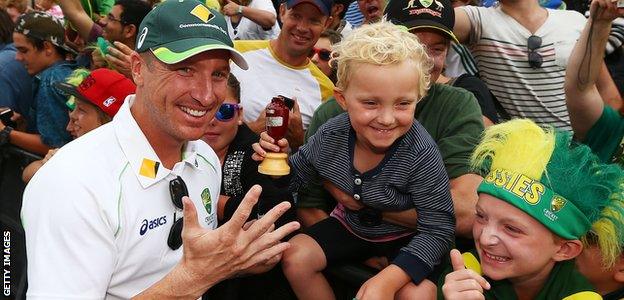
Brad Haddin was Australia's unsung hero of the series, says Graeme Swann
Swann: "Haddin is the most unsung hero of that series. Mitchell Johnson gets all the credit, but Haddin bailed them out time and time again. Without him, without the big scores, it would have been a tight series."
Rogers: "Haddin had arguably the best series of his life. He came out counter-attacking and played some extraordinary innings which were crucial for us. England still had a good attack but we managed to get enough runs, and we managed to wear them down. Four of those games England had their chances, but we managed to win the big moments."
By the end of the series the veteran keeper had scored 493 runs at an average of 61. He visibly enjoyed every one of them.
We need to talk about Kevin
In Perth, Kevin Pietersen had been caught on the long-on boundary trying to hit Nathan Lyon for six, with fielder Ryan Harris having just been placed there for precisely that shot.
Going to Melbourne for the fourth Test it meant he had scored just 165 runs in six innings, with five of those dismissals coming caught down the leg side playing attacking shots.
The end of Pietersen's thrilling, controversial England career was near.
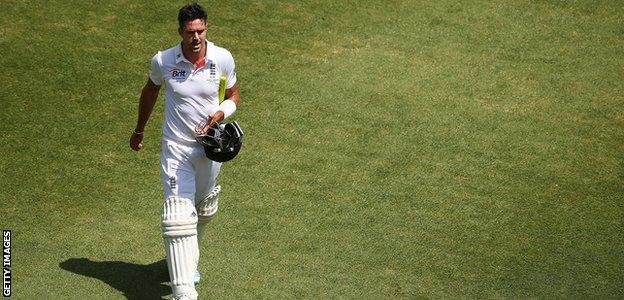
Kevin Pietersen walks off the field for the final time as an England batsman - he never played for his country again after the 2013-14 Ashes
Swann: "Something was up with Kev. He'd stopped being the contrite Kev when he was trying to be a good team-mate."
Panesar: "Sometimes you look at fielding positions, and how the team is from the outside. Duncan Fletcher taught me to always watch players' body language, and I remember Kevin being at fine leg a lot, rather than gully or cover, being distanced from the team rather than amongst it all. I felt he was distant from the game. He was there with the team but not quite there.
"And at that point Alastair Cook needed him to drive it a bit more, for him to take the initiative and say, 'I'm the senior player in this team, I'm going to get everyone together and lead them'. That distance sometimes gets so far that you can't see each other's thinking and understanding. Fine leg is an example of that."
Rankin: "In Alice Springs he had taken a lot of us tailenders to the nets and tried to help us play the short ball. There were a few occasions when he tried to pass on some knowledge to the younger lads. I had no issues with him - I thought he was being a really good pro."
Swann: "When you look at it on a piece of paper it looks petty. But when you're in a team meeting and someone is staring out of the window and whistling rather than trying to help the captain and make the team better, it is horrific. "
Panesar: "I would say at that point he was disengaged. But you can engage him as well. You need people to say, 'Let's help him get engaged with the group'. And from the other side, he could say, 'Right, I'm going to lead this group, I'm going to make the effort', and suddenly all the team are surprised by this and they say, I really like this type of energy that Kevin is showing.
"To get the best of Kevin, he has to feel part of the team. He needs to be given responsibilities, some leadership. He doesn't just want to be a super-talented cricketer who's left alone. He wants people coming to talk to him about the game.
"He really enjoys that, and I felt that part was probably taken away from him. He was just there as Kevin Pietersen the cricketer, rather than Kevin Pietersen the human being."
The wheels coming off
In losing the first three Tests by a combined margin of 749 runs, England had suffered the most complete of sporting defeats.
In being thrashed in the fourth at the MCG by eight wickets, less than a day after being 116 runs ahead with all 10 second innings wickets in hand, they had reached the end.
Rogers: "At 3-0, Trott gone home, Swann retiring, Prior being left out, you could see that the England guys were shot.
"After Perth we got pretty excited that we could create our own piece of history, and that drove us on. And we had been sledged pretty badly in the previous series in England, so it was time to give it back."
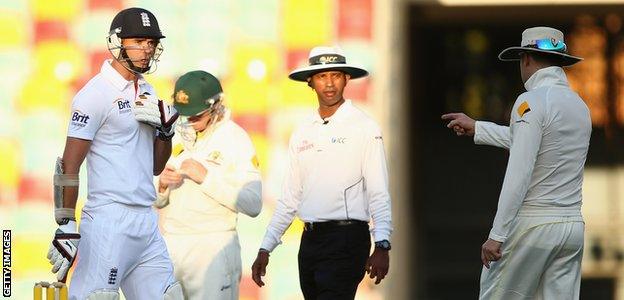
Australia captain Michael Clarke was fined 20% of his match fee for using an obscenity while warning James Anderson to expect a broken arm in the first Test at the Gabba
Panesar: "We had probably given up in Sydney. They picked three debutants, Boyd Rankin wasn't fit…"
Rankin: "It was tricky for me because I wasn't fully fit to play. But I felt it might be my only chance, so I felt I had to give it a go. It was a tough Test for me, because I came off with cramp in my hamstring a couple of times."
In Australia's second innings, another victory seeming inevitable, Rogers scored seven runs off a single shot. It was as many as any of England's top five had managed in their entire first innings.
Rogers: "Ben Stokes had chased it hard, thrown it to the keeper, and because my little bow legs were taking a little while to get there, Bairstow just threw it at the non-striker's end - and there was no-one backing up.
"I don't think I'd ever got a seven in my life. But probably by that stage the wheels were coming off, and things like that start to happen, and England were looking forward to the flight home and licking their wounds."
Panesar: "I did feel sorry for Alastair Cook. You're always switched on, always thinking about the game, how we're going to score runs - so when you come out to bat, you're already exhausted. You go back to the dressing-room, you see the team has been blown away, and you think, this is mentally taking a battering.
"I don't think he got enough support from the senior players - not the level he was looking for. He got it maybe from one or two - possibly Jimmy Anderson, Andy Flower. But they were taking a battering as well.
"When the energy drains out of the whole group it's very difficult. You sort of think, let's just get this over and done with and restart next summer."
A coach on the up, a coach on his way out
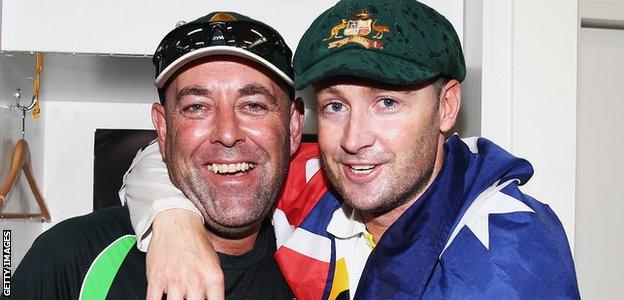
Australia's success was masterminded by coach Darren Lehmann, left, and captain Michael Clarke
Australia had only appointed Darren Lehmann at the end of June. England's Andy Flower had been in charge for three successful Ashes series won by a combined margin of 8-2, and as England became the number one ranked Test nation in the world.
It would be Lehmann who ended the series with his reputation burnished, Flower who would soon step down, his tactical decisions and handling of key players questioned.
Rogers: "Darren was huge in changing the mentality of the guys. It had been a poor time for Australian cricket with what happened in India leading up to the 2013 Ashes and then Mickey Arthur being sacked. There were a lot of doubts, and it needed someone strong who could come in and give some direction.
"He gave the guys a lot of belief in what they were doing. And the guys knew exactly what their role was, and they went out and delivered. He's one of the best coaches I've ever worked under. He has a smile on his face; he tries to remind you it's just a game."
Australia's media dubbed their team 'the Unchangeables' after Lehmann was able to pick the same XI for each of the five Tests.
England, by contrast, went through 18 players - a record for an overseas tour. The Unrecognisables or Unwatchables, depending how cruel the observer wanted to be.

Leg-spinner Scott Borthwick was given his debut in the fifth Test at Sydney - and has not played Test cricket since
Rankin: "It was a bit strange for me with Flower - I didn't really speak to him. I wouldn't say I was scared of him, but a lot of the younger players weren't playing as freely as they would have liked, and it felt like there was a lot of tension whenever he was around.
"It was strange for me for a coach of his calibre and what he's done in the game being like that. During that Ashes tour I felt really awkward around him. He was strict and he was really serious all the time."
Johnson: "Lehmann played a massive part. He came in at a time when the team was in a bad place and turned it around really quickly.
"He wanted us to play our natural games at a time when we hadn't been enjoying our cricket. He changed the dressing room atmosphere, and having played for Australia himself, he knew what it was all about."
'We put the moustache in an urn'
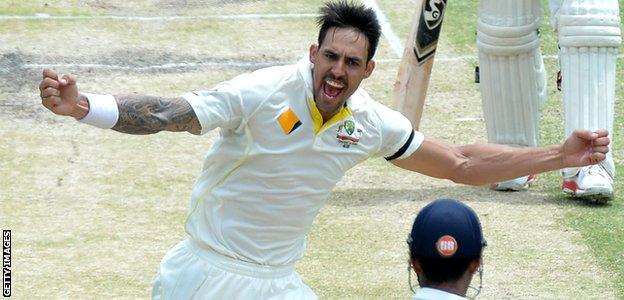
Mitchell Johnson dominated England's batsmen with his pace
Johnson had only been selected for Australia's initial Ashes squad because of injury to younger guns like James Pattinson, Mitchell Starc and Pat Cummins.
He would end that Ashes with 37 wickets at an average of 13.9, his long black moustache further adding to the sense that Dennis Lillee had been reborn. There has seldom been sweeter sporting revenge taken.
Johnson: "I wasn't going to grow the moustache. Then my wife said, 'It's for charity, it's not hard, do it for a month'.
"When November was up, the boys said that I couldn't shave it: 'It defines who you are right now.'
"They were pretty upset when I had it shaved. But we sold the ashes of the mo. We put the hair in an urn, and someone got it for two or three grand."
Rogers: "I did have to face him in the nets, and it was no fun. He would be going at 80%, and that was hard enough. And that summer he bowled as well as I've ever seen anyone bowl. He made the English batsmen look second rate. I was glad I was on his side."
Rankin: "We spent a lot of time in the nets trying to combat Johnson. I remember a couple of sessions where we literally spent the whole time with the dog sticks, bowling bouncer after bouncer. But it's never going to be the same as in a match situation."
Rogers: "He had had some extraordinary moments and some similarly extraordinary lows, so I think he was a little bit jaded by those experiences. To see it all come together for him - and he was enjoying himself - was wonderful. Once he got a roll on, the England players were almost a bit scarred."
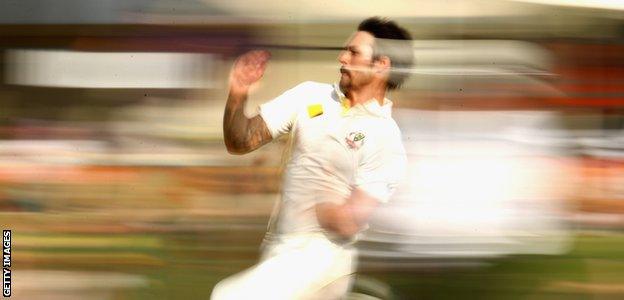
"You feel like you can do nothing wrong" - Mitchell Johnson on the feeling of being in supreme form
Johnson: "When you're on top of your game like that it feels pretty bloody good. It feels like you're floating. In your run-up, you know what ball you want to bowl, where you want to bowl it. You don't feel like you can bowl a bad ball, or do anything wrong. It's what you play the game for."
Panesar: "Fear? There was definitely fear. It's like a boxing match when every round in the ring you're getting pounded."
Jonny Bairstow, England wicketkeeper: "He wasn't only the man of the series. He was the series.
"He bowled ridiculously well. You speak to people that have faced spells of fast bowling in different circumstances on different pitches, whether that's Shoaib Akhtar or Brett Lee or whoever you want to choose, about the fastest bowler they ever faced. In that series, I can firmly say, for the majority of our side, Johnson bowled the fastest that any batsman had faced to date."
- Published21 November 2017
- Published21 November 2017

- Published21 November 2017
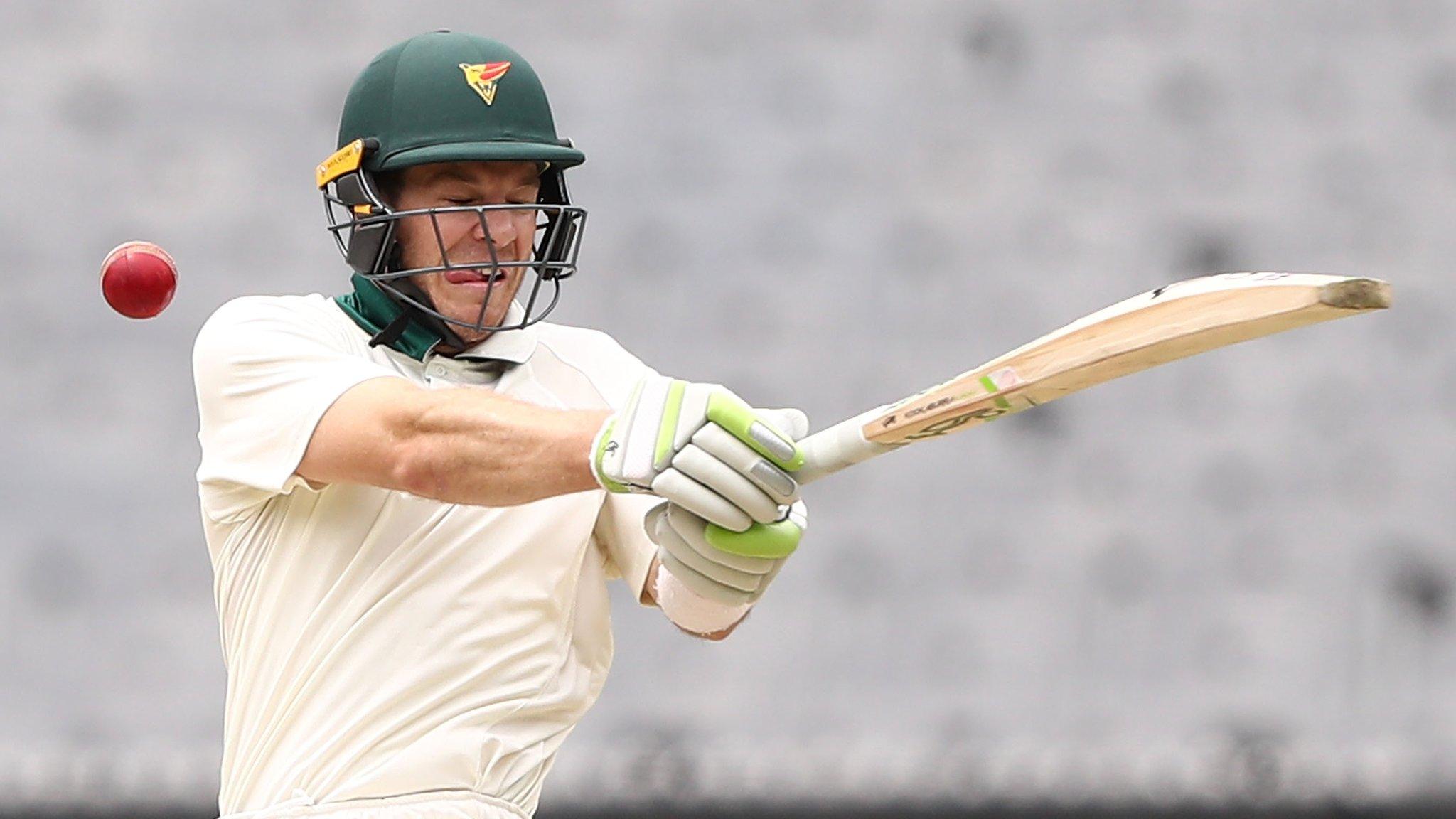
- Published9 January 2018

- Published12 January 2018
